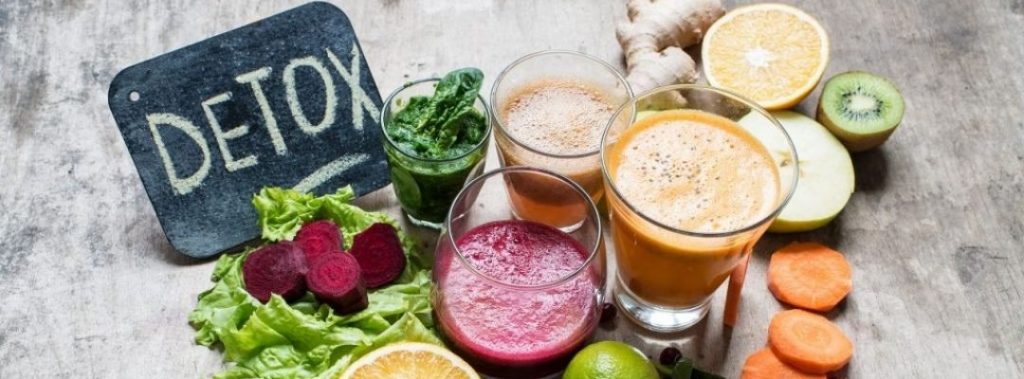It’s officially the detox time of year—when people seek to break unhealthy habits, boost weight loss and generally try to recover from months of gluttony. While many people tend to reach for a tea or powder to aid in their detox efforts, the truth is that our bodies actually do a pretty good job of cleansing on their ownWe are in a constant state of elimination, as we shed the bacteria, viruses and toxins that impact our overall health. There are foods, however, that can help make this process as efficient as possible.
If you’ve been experiencing fatigue, brain fog, bloating, constipation, or you’re just not really feeling like your best self, it may be time to reset your body’s natural, ongoing detoxification. Here are five easy-to-find foods that will help you get started:

Bitter or Leafy Greens
Bitter greens—like dandelion, chard, kale and mustard greens—are used in herbal medicine systems around the world to help fight a number of illnesses, including poor liver health, sluggishness, diabetes, kidney problems and gallstones. Dandelion root, in particular, helps stimulate the digestive system, prompts the liver and gallbladder to release proper levels of bile, relieves constipation and has many anti-aging effects.
One particular chemical found in bitter greens, called taraxacin, has been shown in studies to promote stronger immunity against viruses, support weight loss, reduce cancer risk and even help restore hormonal balance. Greens are also beneficial for detoxification because of their high levels of magnesium, water, fiber and electrolytes, like potassium.
Beets
According to a number of holistic healing traditions—including Ayurveda, India’s 5,000 year-old healing system—beets hold a special ability to serve as a natural liver tonic, energy restorer and blood cleanser. Beets are even thought to help with emotional balancing, and are therefore recommended during colder months of the year in which many people start to feel weighed down.
Consuming beets will supply you with lots of potassium, fiber, manganese and folate, thereby helping to improve blood flow, protect the blood vessels from damage and prevent fatigue. Additionally, special compounds in beets called betalains help to form gluthione, which neutralizes toxins or heavy metals and makes them water-soluble so they can be easily be flushed out.
Berries (Especially Acai & Goji)
Not only do they taste delicious in smoothies, oatmeal, yogurt or desserts, but berries of all sorts also have strong anti-inflammatory and antioxidant abilities. In addition to consuming fresh berries, like raspberries and blueberries, it’s also worth getting your hands on dried “superfood” berries like goji, acai and mulberry.
Traditionally goji berry has been used for benefits like improving digestion, helping with weight loss and even supporting vitality, longevity and stamina. Even very small does of these superfood berries have extremely high oxygen radical absorbance capacity (ORAC) scores, which measures the antioxidant value of various foods. Both goji and Acai (normally available in dried powder form) beat out other popular health foods like apples, blueberries, spinach and pomegranate seeds in terms of providing higher levels of antioxidants gram for gram. And these are exactly the compounds you need if you want to keep your skin glowing, your energy levels high and your mind sharp.
Fennel

Sweet-tasting fennel is probably best known for having a soothing effect on the entire digestion system, but did you know that fennel also supplies lots of fiber and vitamin C, helps boost the immune system and even has natural antibacterial properties according to studies? There are a variety of different ways you can consume fennel daily, including eating it raw, cooked or steeped in hot tea.
Fennel is also used to make concentrated fennel essential oil, which contains an even stronger dose of powerful active ingredients, including antioxidants and anti-inflammatories like anethole, limonene and quercetin. These have been found to help reduce symptoms of colic in infants, soothe the respiratory system, help heal wounds, ease stomach or muscle cramps, reduce bloating and much more.
Chia Seeds
Like most other seeds, chia seeds are exceptionally high in fiber, with about 5-6 grams per every tablespoon. A couple spoonfuls of these raw, virtually tasteless seeds will provide just short of half of your daily fiber needs, a major benefit considering most people don’t get anywhere near the recommended 25 grams or more that they need on a daily basis.
Thanks to its high levels of dietary fiber, chia helps promote bowel regularity and formation of healthy stool, while slowing down the digestion of sugar, regulating cholesterol and helping you feel full for longer. You can easily add more chia seeds to your diet by whipping up easy dishes like chia seed pudding or my coconut chia protein pancakes.

